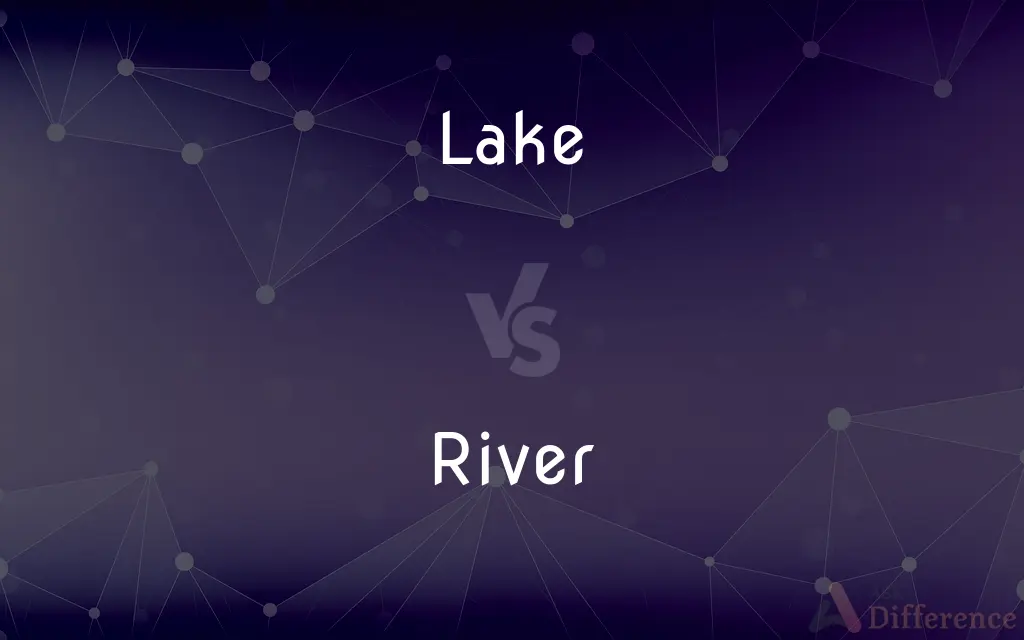Lake vs. River — What's the Difference?
By Tayyaba Rehman — Updated on October 3, 2023
A "Lake" is a large body of still water surrounded by land. A "River" is a flowing body of water that moves continuously towards an ocean, sea, or another river. Both are freshwater sources, but lakes are static while rivers flow.

Difference Between Lake and River
Table of Contents
ADVERTISEMENT
Key Differences
A Lake is a substantial inland body of standing water that has accumulated in a hollow or basin on the Earth's surface. These water bodies can vary significantly in size, from small ponds to massive bodies like the Great Lakes. They are often fed by rivers, streams, or underground springs, and they can have outlets, such as rivers or other waterways. Lakes often serve as significant freshwater reservoirs.
On the other hand, a River is a natural flowing watercourse. It originates from a source, which can be a spring, glacier, or lake, and it moves along a defined path until it reaches its endpoint, often an ocean, sea, or another lake. As it flows, a River might collect water from rainfall, snowmelt, or other tributaries, increasing its volume. Rivers play essential roles in shaping landscapes, facilitating transportation, and providing habitats for various species.
While both Lakes and Rivers are inland bodies of freshwater, their primary distinction lies in their state of motion. Lakes are primarily still, while Rivers are continuously moving. The ecosystem, aquatic life, and the surrounding environment of a Lake can differ greatly from that of a River due to this difference in motion and the varied depths of lakes.
Another point to note is that Rivers often feed lakes. For instance, several rivers might flow into a lake, providing it with a continuous supply of fresh water. Conversely, lakes can also be sources of rivers. This interdependence highlights the intricate relationship between Lakes and Rivers in nature.
Comparison Chart
Definition
Inland body of standing water
Flowing watercourse from a source to an endpoint
ADVERTISEMENT
Motion
Still, with some wave activity
Continuously flowing
Feeding Mechanism
Fed by rivers, streams, or springs
Collects water from rainfall, snowmelt, or tributaries
Ecosystem
Often deeper with varied aquatic life depending on depth
Varies with flow, often shallower with different habitats
Relationship with the Other
Can be the starting point or endpoint for rivers
Can feed into lakes or originate from them
Compare with Definitions
Lake
Basin filled with water
The basin formed a beautiful Lake over time.
River
Flowing watercourse
The River winds through the valley.
Lake
Freshwater reservoir
The town sourced its drinking water from the Lake.
River
Shapes landscapes
Over time, the River carved out a canyon.
Lake
Natural or man-made pond
They built a Lake to enhance the park's beauty.
River
Moves from source to mouth
The River begins in the mountains and ends in the ocean.
Lake
Habitat for aquatic life
The Lake is home to several fish species.
River
Freshwater habitat
Various animals come to the River to drink.
Lake
A lake is an area filled with water, localized in a basin, surrounded by land, apart from any river or other outlet that serves to feed or drain the lake. Lakes lie on land and are not part of the ocean, although like the much larger oceans, they form part of Earth's water cycle.
River
A river is a natural flowing watercourse, usually freshwater, flowing towards an ocean, sea, lake or another river. In some cases, a river flows into the ground and becomes dry at the end of its course without reaching another body of water.
Lake
A large area of water surrounded by land
Lake Victoria
Boys were swimming in the lake
River
A large natural stream of water flowing in a channel to the sea, a lake, or another river
The Mekong River
River pollution
The River Danube
Lake
An insoluble pigment made by combining a soluble organic dye and an insoluble mordant.
River
Abbr. R. A large natural stream of water emptying into an ocean, lake, or other body of water and usually fed along its course by converging tributaries.
Lake
A large inland body of fresh water or salt water.
River
A stream or abundant flow
A river of tears.
Lake
A scenic pond, as in a park.
River
The fifth and last of the community cards in various poker games, especially Texas hold'em.
Lake
A large pool of liquid
A lake of spilled coffee on my desk.
River
To win a hand in poker by beating (someone) on the basis of the last community card that is turned up.
Lake
A pigment consisting of organic coloring matter with an inorganic, usually metallic base or carrier, used in dyes, inks, and paints.
River
A large and often winding stream which drains a land mass, carrying water down from higher areas to a lower point, oftentimes ending in another body of water, such as an ocean or in an inland sea.
Occasionally rivers overflow their banks and cause floods.
Lake
A deep red.
River
Any large flow of a liquid in a single body.
A river of blood
Lake
A large, landlocked stretch of water or similar liquid.
River
(poker) The last card dealt in a hand.
Lake
A large amount of liquid; as, a wine lake.
River
(typography) A visually undesirable effect of white space running down a page, caused by spaces between words on consecutive lines happening to coincide.
Lake
A small stream of running water; a channel for water; a drain.
River
One who rives or splits.
Lake
(obsolete) A pit, or ditch.
River
(poker) To improve one’s hand to beat another player on the final card in a poker game.
Johnny rivered me by drawing that ace of spades.
Lake
(obsolete) An offering, sacrifice, gift.
River
One who rives or splits.
Lake
(dialectal) Play; sport; game; fun; glee.
River
A large stream of water flowing in a bed or channel and emptying into the ocean, a sea, a lake, or another stream; a stream larger than a rivulet or brook.
Transparent and sparkling rivers, from which it is delightful to drink as they flow.
Lake
(obsolete) A kind of fine, white linen.
River
Fig.: A large stream; copious flow; abundance; as, rivers of blood; rivers of oil.
Lake
In dyeing and painting, an often fugitive crimson or vermillion pigment derived from an organic colorant (cochineal or madder, for example) and an inorganic, generally metallic mordant.
River
To hawk by the side of a river; to fly hawks at river fowl.
Lake
In the composition of colors for use in products intended for human consumption, made by extending on a substratum of alumina, a salt prepared from one of the certified water-soluble straight colors.
The name of a lake prepared by extending the aluminum salt prepared from FD&C Blue No. 1 upon the substratum would be FD&C Blue No. 1--Aluminum Lake.
River
A large natural stream of water (larger than a creek);
The river was navigable for 50 miles
Lake
(obsolete) To present an offering.
River
Transportation route
They traveled up the River by boat.
Lake
To leap, jump, exert oneself, play.
Lake
To make lake-red.
Lake
A pigment formed by combining some coloring matter, usually by precipitation, with a metallic oxide or earth, esp. with aluminium hydrate; as, madder lake; Florentine lake; yellow lake, etc.
Lake
A kind of fine white linen, formerly in use.
Lake
A large body of water contained in a depression of the earth's surface, and supplied from the drainage of a more or less extended area.
Lake
To play; to sport.
Lake
A body of (usually fresh) water surrounded by land
Lake
A purplish red pigment prepared from lac or cochineal
Lake
Any of numerous bright translucent organic pigments
Lake
Inland water body
The Lake looked serene in the moonlight.
Common Curiosities
Do Rivers always flow into the sea?
No, rivers can end in lakes, seas, other rivers, or even deserts.
Are all Lakes freshwater?
No, some lakes, like the Great Salt Lake, are saline.
Why are some Rivers muddy while others are clear?
It depends on the sediment the river carries and its speed.
Can a Lake have no outlets?
Yes, these are called endorheic lakes, and they don't drain into the sea.
Which is deeper, a Lake or a River?
Lakes are often deeper, but it varies based on the specific lake or river.
Can Rivers create Lakes?
Yes, when rivers deposit sediments and create a natural dam.
Are Lakes always natural?
No, some lakes are man-made and are called reservoirs.
How do Rivers impact ecosystems?
Rivers provide water, transport nutrients, and offer habitats, shaping ecosystems.
Share Your Discovery

Previous Comparison
Tweezer vs. Tweezers
Next Comparison
Knack vs. NackAuthor Spotlight
Written by
Tayyaba RehmanTayyaba Rehman is a distinguished writer, currently serving as a primary contributor to askdifference.com. As a researcher in semantics and etymology, Tayyaba's passion for the complexity of languages and their distinctions has found a perfect home on the platform. Tayyaba delves into the intricacies of language, distinguishing between commonly confused words and phrases, thereby providing clarity for readers worldwide.














































